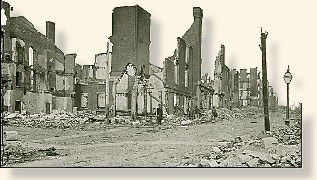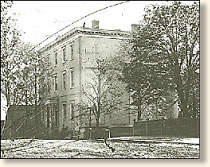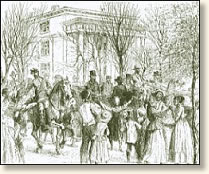|
President Lincoln
Enters Richmond, 1865
The capture of Richmond had been the goal of the Union Army since the beginning of the Civil War. The Confederate capital lay tantalizingly close to Washington - only 100 miles - but it took four years of hard battle before the city fell to Union troops on April 3, 1865.

Richmond in Ruins, 1865
|
Word reached the city on Sunday morning April 2 that the Confederate defenses had been breached and General Lee's army was heading west in retreat. Nothing lay between the Capital and the advancing Union Army. The Confederate government packed what records it could and fled. An observer described the scene: "All that Sabbath day the trains came and went, wagons, vehicles, and horsemen rumbled and dashed to and fro, and, in the evening, ominous groups of ruffians - more or less in liquor - began to make their appearance on the principal thoroughfares of the city. At night came on pillage and rioting took place."
Fires broke out and explosions ripped through the city as the flames reached stores of munitions placed near the waterfront. At daybreak April 3, Union troops entered the city.
Upon hearing the news of the fall of the Confederate Capital, President Lincoln accompanied by his son Tad, boarded a boat and sailed to survey the scene himself. Thomas Thatcher Graves served on the staff of General Godfrey Weitzel and described Lincoln's entrance into the city:

Jefferson Davis's House
|
"The next day after our entry into the city, on passing out from Clay Street, from Jefferson Davis's house, I saw a crowd coming, headed by President Lincoln, who was walking with his usual long, careless stride, and looking about with an interested air and taking in everything. Upon my saluting he said: 'Is it far to President Davis's house?' I accompanied him to the house, which was occupied by General Weitzal as headquarters. The President had arrived about 9 o'clock, at the landing called Rocketts, upon Admiral Porter's flag-ship, the Malvern, and as soon as the boat was made fast, without ceremony, he walked on shore, and started uptown. As soon as Admiral Porter was informed of it he ordered a guard of marines to follow as escort; but in he walk of about two miles they never saw him, and he was directed by negroes.
At the Davis house, he was shown into the reception-room, with the remark that the housekeeper had said that the room was President Davis's office. As he seated himself he remarked, 'This must have been President Davis's chair," and, crossing his legs, he looked far off with a serious, dreamy expression. At length he asked me if the housekeeper was in the house. Upon learning that she had left he jumped up and said, with a boyish manner, 'Come, let's look at the house!' We went pretty much over it; I retailed all that the housekeeper had told me, and he seemed interested in everything. As we came down the staircase General Weitzel came, in breathless haste,

Lincoln leaves Davis's house
from a contemporary drawing
|
and at once President Lincoln's face lost its boyish expression as he realized that duty must be resumed. Soon afterward Judge Campbell, General Anderson (Confederates), and others called and asked for an interview with the President. It was granted, and took place in the parlor with closed doors.
I accompanied President Lincoln and General Weitzel to Libby Prison and Castle Thunder, and heard General Weitzel ask President Lincoln what he (General Weitzel) should do in regard to the conquered people. President Lincoln replied that he did not wish to give any orders on that subject, but, as he expressed it, 'If I were in your place I'd let 'em up easy, let 'em up easy.
"
References:
McPherson, James M. Battle Cry of Freedom: the Civil War Era (1988). Buel, Clarence, and Robert U. Johnson, Battles and Leaders of the Civil War, Vol.IV (1888; reprint ed., 1982).
How To Cite This Article:
"President Lincoln Enters Richmond, 1865" EyeWitness to History, www.eywitnesstohistory.com (2000).
|






